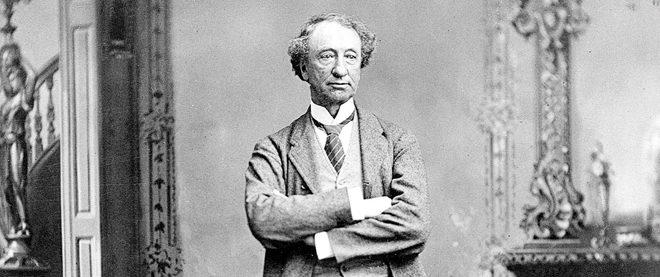What Old Tomorrow can teach us today
Sir John A.’s skills as a consensus builder are lost on our modern leaders
National Archives of Canada/CP
Share

Can Canadian politics learn anything from old dead prime ministers? On John A. Macdonald’s 197th birthday, consider how the first prime minister spent his 70th birthday.
On Jan. 11, 1885, Macdonald entered his eighth decade with a quick trip to Montreal for a snowy parade by torchlight and a gala dinner with hundreds of supporters. It was adulation and cheers all around. But right after the partying, John A. hastened back to the office in Ottawa. A crisis was brewing. Barely a year short of completion, the Pacific railroad company, Macdonald’s flagship project, was near collapse. With creditors at the door, CPR president George Stephen was haunting the prime minister’s office, begging for one more bailout.
Macdonald knew the stakes. “The day the CPR busts, the government busts the day after,” one of his advisers put it succinctly. The money had to be found. If 1885 were 2012, that would have ended the crisis. Macdonald was the dominating political figure of his day and his re-elected government held a big majority. If Macdonald favoured the bailout, surely all he had to do was put the cheque in the mail. Isn’t that what a stable national majority government leader does?
Instead, for another six months, Old Tomorrow kept Stephen waiting while the railroad lurched toward bankruptcy. The problem was Macdonald’s caucus and cabinet had deserted him. They could not stomach throwing more money at the railroad. Cabinet colleagues said letting the company fail was better politics than saving it. Backbenchers from the Maritimes and Quebec demanded something in exchange: help for their own pet railroads. His own finance minister, Leonard Tilley, thought the government could scoop up the assets of the bankrupt CPR and finish the job itself. In short, Macdonald led a majority government but lacked the parliamentary votes for a bailout.
Macdonald did not discipline his dissident ministers of 1885. The colossus of Canadian politics did not drive skeptical backbenchers out of politics as a modern leader would. Macdonald lived by the rules of 19th-century Canadian Parliaments: a leader answered to caucus, not the other way round. If a prime minister could not assemble a majority of his own MPs behind him on an issue, he accommodated.
That ability to accommodate certainly contributed to his reputation as Canada’s “nation maker,” as Richard Gwyn brilliantly portrayed him. But perhaps Macdonald’s greatest skill was as a majority maker. In a recent Historica-Dominion Institute project to promote the celebration of “John A. Day,” we suggested that what kept Macdonald at the top during his extraordinary career was rarely the authority of single-minded vision. More often, it was his uncanny ability to pull together majorities in the House when none seemed to exist.
That’s not an issue for Canadian leaders now. Today we accept that MPs should have no political opinions, that only leaders and their sleek young operatives think and decide. (Then we complain about the democratic deficit.) It was harder for Macdonald and his contemporaries.
Is this just an obsolete quirk of 19th-century political mores? Hardly. In 2010, an Australian caucus removed an incumbent prime minister on the eve of a national election. And though it wasn’t much noted in Canada, one reason British Prime Minister David Cameron broke with Europe over the euro was his inability to count on his own caucus to support a pro-Europe stance. All over the world, parliamentary leaders need those consensus-building skills that Macdonald had in such abundance. Only Canadian MPs think it is their job to give their leaders a free hand for years at a time.
That railroad crisis of 1885? The CPR dangled until May. Then came the Metis resistance on the South Saskatchewan, and it was the unfinished railroad that rushed troops to the West. Suddenly the CPR could do no wrong. Caucus came around, and the votes were there. The last spike was driven six months later. John A. Macdonald looked like a genius. Again.
Christopher Moore is a two-time Governor-General’s Literary Award winner whose video talks on John A. Macdonald are available at the Historica-Dominion Institute’s website (historica-dominion.ca) as part of a Sir John A. national education campaign.